|
|
|
Sort Order |
|
|
|
Items / Page
|
|
|
|
|
|
|
| Srl | Item |
| 1 |
ID:
133369
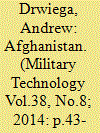

|
|
|
|
|
| Publication |
2014.
|
| Summary/Abstract |
A complete analysis of ISAF's combat commitment within Afghanistan is impossible to summaries in a single article; but, by focusing on specific campaign factors, some lessons for the future can be discerned while a little more time remains with boots on the ground.
|
|
|
|
|
|
|
|
|
|
|
|
|
|
|
|
| 2 |
ID:
132344
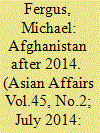

|
|
|
|
|
| Publication |
2014.
|
| Summary/Abstract |
A number of the NGOs now working in Afghanistan, like Oxfam, Afghan Aid and the Agha Khan Foundation have been there for many years and show no sign of planning to leave when NATO troops withdraw. This article is written by a committee member of the Norwegian Afghanistan Committee, which was formally established in Bergen in 1980, as a political reaction to the Soviet invasion. In 1983, the Committee started sending health workers into unoccupied areas of the country and their activities have continued ever since, though the Soviets left nearly a quarter of a century ago. The goodwill and contacts built up over time by the Committee and other NGOs have been important in validating their presence, their activities and their motives. To be useful in Afghanistan needs a commitment to the long haul.
|
|
|
|
|
|
|
|
|
|
|
|
|
|
|
|
| 3 |
ID:
133161
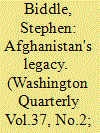

|
|
|
|
|
| Publication |
2014.
|
| Summary/Abstract |
The war in Afghanistan is not over. Nor is it ending any time soon. The U.S. role may end in 2016, in whole or in part, but the war will continue-and its ultimate outcome is very much in doubt. The conflict is now stalemated militarily, and will likely stay that way as long as outsiders pay the large bills needed to keep the Afghan National Security Forces (ANSF) in the field and fighting. The war will thus grind onward until this funding dries up or the two sides negotiate a compromise settlement, neither of which is imminent. Depending on how any talks unfold, historians in 2050 could thus look back on this war as a costly but tolerable outcome for the West, as a wasteful disaster, or as something in between; for now, all we know for sure is that it continues.
|
|
|
|
|
|
|
|
|
|
|
|
|
|
|
|
| 4 |
ID:
133602
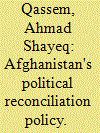

|
|
|
|
|
| Publication |
2014.
|
| Summary/Abstract |
The Afghan government's peace and reconciliation overtures to the militants, initially at the unofficial level but later sanctioned officially, have formed a key theme of state security policy from the early days of the post-Taliban administration in Afghanistan. Yet far from producing peace and stability, they seem to have played into the hands of the violent groups intent on overthrowing the country's internationally supported and legitimate political system in the past decade. There is no doubt about the importance of national reconciliation as a wider process of overcoming the legacy of beleaguered social relationships and forging a common vision for the future among all Afghans, but the nature of the government's reconciliation policy, which borders on appeasement of the militants, seems so far to have created more vulnerabilities than strengths in the face of increasingly emboldened anti-state violent groups.
|
|
|
|
|
|
|
|
|
|
|
|
|
|
|
|
| 5 |
ID:
131852
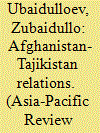

|
|
|
|
|
| Publication |
2014.
|
| Summary/Abstract |
This article attempts to touch upon the relations between Afghanistan and Tajikistan, two neighboring countries, from the historical perspective and the current period. The article analyses the history of Afghanistan-Tajikistan relations during and after the Soviet era, especially during the Afghan Mujahideen's struggle against the Soviet occupational army and Taliban regime in Afghanistan, the Tajikistan civil war of 1992-1997, and after September 11, 2001. In addition, the issues of the ethnic Tajiks in Afghanistan, the violent and vulnerable Tajik-Afghan border, the withdrawal of NATO troops from Afghanistan in 2014 and its impact on Afghanistan-Tajikistan relations, and the new phase of economic relations and an effective cooperation between the both countries are discussed. The article tries to fill the gaps within the body of existing literature and understanding concerning the topic.
|
|
|
|
|
|
|
|
|
|
|
|
|
|
|
|
| 6 |
ID:
131794
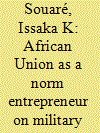

|
|
|
|
|
| Publication |
2014.
|
| Summary/Abstract |
Between 1952 and 2012, there were a total of 88 successful military coups in Africa. Of those, 63 occurred prior to 1990, and 10 cases since the adoption, by the defunct Organization of African Unity (OAU), of the Lomé Declaration in July 2000, banning military coups and adopting sanctions against regimes born out of this. The article shows that the African Union (AU) has followed in the footsteps of the OAU in this regard. Assisted by some African regional organisations and international partners, the combined effect of this policy of the AU - assisted by other factors - has been a significant reduction in the occurrence of this phenomenon. While not constituting a funeral arrangement for military coups in the immediate future, these developments - if they were to continue - may indeed make this eventuality achievable in the long run. But the article also reveals some challenges the AU is facing in ensuring this.
|
|
|
|
|
|
|
|
|
|
|
|
|
|
|
|
| 7 |
ID:
132034
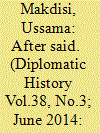

|
|
|
|
|
| Publication |
2014.
|
| Summary/Abstract |
The question of how to represent the U.S. role in the Middle East brings to the fore the question that Edward Said first raised in 1978 in Orientalism about the nature of American understandings of the Middle East. More than three decades after the publication of his book, Said's criticism of Orientalist scholarship-and his accompanying plea for a secular humanistic interpretation to replace it-remain both topical and enigmatic. It is one thing to criticize American representations of foreign cultures; it is an entirely different matter to study American engagements with them. These are by no means unrelated endeavors, but by the same token, they entail very different conceptions of what constitutes a field of inquiry and how to go about studying it comprehensively. The recent emergence of a more critical scholarship of America and the Middle East, therefore, begs the question of whether it is possible to write a history that takes both the Americans and Arabs equally seriously despite the prevailing political climate, and ultimately what kind of methodology this might entail for the rewriting of U.S.-Arab relations, and more broadly, American involvement in the world.
|
|
|
|
|
|
|
|
|
|
|
|
|
|
|
|
| 8 |
ID:
132781
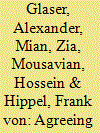

|
|
|
|
|
| Publication |
2014.
|
| Summary/Abstract |
Iran is negotiating with a group of six states over the future of its nuclear program. In November 2013, Iran and the P5+1 (China, France, Germany, Russia, the United Kingdom, and the United States) agreed to a Joint Plan of Action that seeks to reach a "comprehensive solution" by July 20, 2014.
The goal is an agreement on a set of measures that can provide reasonable assurance that Iran's nuclear program will be used only for peaceful purposes and enable the lifting of international sanctions imposed on Iran over the past decade because of proliferation concerns.
A key challenge is to reach agreement on limiting Iran's uranium-enrichment program, which is based on gas centrifuges, in a way that would enable Iran to meet what it sees as its future needs for low-enriched uranium (LEU) fuel for nuclear research and power reactors while forestalling the possibility that this program could be adapted to quickly produce highly enriched uranium at levels and in amounts suitable for use in nuclear weapons
|
|
|
|
|
|
|
|
|
|
|
|
|
|
|
|
| 9 |
ID:
132417
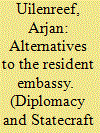

|
|
|
|
|
| Publication |
2014.
|
| Summary/Abstract |
Increasingly integrated in a common political entity, the European Union's member states are exploring new avenues to shape and maintain their mutual relations. This analysis describes three alternatives to the traditional resident embassy by which ministries of foreign affairs within the EU attempt to maintain diplomatic networks. The models discussed are secondments within member states' capitals, visiting ambassadors, and co-location and co-operation. In other words, with regard to different modes of representation, member states can consider diving in, stepping back, or pooling and sharing. These developments shed light on the ways in which the diplomatic machineries of the member states are trying to adapt to the demands of a "post-Westphalian" environment such as that of the EU.
|
|
|
|
|
|
|
|
|
|
|
|
|
|
|
|
| 10 |
ID:
130843
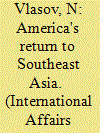

|
|
|
|
|
| Publication |
2014.
|
| Summary/Abstract |
The article examines U.S. foreign relations with Southeast Asia. An increase in U.S. involvement in the region under the administration of President Barack Obama is considered. A contradiction in U.S. policy is said to exist between insistence by the administration that its desire for stability and freedom of the seas in Southeast Asia is not intended as containment of China and China's aggressive maritime boundary claims in the South China Sea.
|
|
|
|
|
|
|
|
|
|
|
|
|
|
|
|
| 11 |
ID:
131029
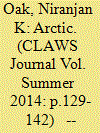

|
|
|
|
|
| Publication |
2014.
|
| Summary/Abstract |
Regionalism as a political project has been a signi?cant phenomenon in post-1945 international relations. The third phase of regional integration began towards the end of the 19805 within the international context created by the end of the Cold War. Academics dubbed it as "new regionalism".' Most of the regional organisations that came up in those days were based on economic cooperation among the states. It was an era of globalisation. The Arctic Council (AC) which emerged in 1996 was a unique case. The 'Arctic' has emerged as a region in international cooperation during the past 20-30 years, as manifest in the creation of the AC. The objective of the AC was sustainable development and environmental protection only, and that is why it may be termed as a unique case in that period.
|
|
|
|
|
|
|
|
|
|
|
|
|
|
|
|
| 12 |
ID:
130897
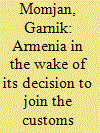

|
|
|
|
|
| Publication |
2014.
|
| Summary/Abstract |
I will speak about the situation in Armenia. On September 3, 2013 at the meeting with President Putin in Moscow, our President Serzh Sargsyan announced that Armenia would join the custom union. This statement echoed all over the world : in the evening, all leading information agencies and the media - BBC, Euronews and the Wall Street Journal were discussing it; they concluded that Russia had put pressure on Armenia.
|
|
|
|
|
|
|
|
|
|
|
|
|
|
|
|
| 13 |
ID:
130176
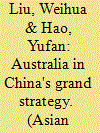

|
|
|
|
|
| Publication |
2014.
|
| Summary/Abstract |
This paper examines China's strategic interests in Australia. From the security per- spective, Beijing hopes that Australia will be a constructive factor for its peaceful rise. On the economic side, Beijing hopes that the bilateral relationship will ensure sufficient and sustainable resources and energy supplies from Australia for China's domestic needs
|
|
|
|
|
|
|
|
|
|
|
|
|
|
|
|
| 14 |
ID:
130174


|
|
|
|
|
| Publication |
2014.
|
| Summary/Abstract |
In responding to China's rise, the best strategy for Australia involves a combination of accommodation and ''soft balancing.'' The viability of this strategy is related to the extent to which U.S.-China relations are cooperative or conflictual. Recent Australian governments have been successful in implementing this preferred strategy.
|
|
|
|
|
|
|
|
|
|
|
|
|
|
|
|
| 15 |
ID:
128435
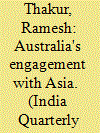

|
|
|
|
|
| Publication |
2013.
|
| Summary/Abstract |
The ebb and flow of coping with Australia's identity dilemma as a European settler society located on the geographical edge of Asia leads to bouts of agonising, excitement and temporising. This has been given particular cogency with the power shift underway from the trans-Atlantic to the Asia-Pacific. The 2012 White Paper set 25 national objectives to be met by 2025, with targets ranging from improving trade links and increasing scholarships to teaching priority Asian languages. But in this transactional embrace of Asia that highlights economic and trade links, gaps might open up between ambition and delivery, especially amidst continuing evidence of insensitivity to how Asians forge lasting relationships. Ties with China are dominated by trade but security concerns remain. Relations with India should improve with the removal of the nuclear issue as an irritant and growing trade and tourist numbers. Japan remains an important trade and diplomatic partner. And geography and demography ensure that Indonesia is no less important to Australia than Asia's big three.
|
|
|
|
|
|
|
|
|
|
|
|
|
|
|
|
| 16 |
ID:
132864
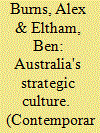

|
|
|
|
|
| Publication |
2014.
|
| Summary/Abstract |
This article draws on fourth generation strategic culture debates to show the gap between the rhetoric of Australian defence and the more modest reality. Our analysis shows that these limits derive from tensions between national strategic culture and organizational strategic subcultures. There are serious debates in the nation regarding the preferred course of the Australian military and security policy. This article frames these debates by examining the 'keepers' of Australia's national strategic culture, the existence of several competing strategic subcultures, and the importance of norm entrepreneurs in changing defence and national security thinking. Strategic subcultures foster compartmentalization, constraints, and bureaucratic silos that narrow national conceptions of security threats and opportunities, and impinge on the formation of coherent foreign and defence policy in relation to the Asia-Pacific region. This analysis shows that a distinct national strategic culture and organizational strategic subcultures endure beyond individual governments, placing potential limits on Australia's interface with other Asia-Pacific strategic cultures in the future.
|
|
|
|
|
|
|
|
|
|
|
|
|
|
|
|
| 17 |
ID:
131619
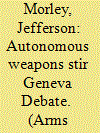

|
|
|
|
|
| Publication |
2014.
|
| Summary/Abstract |
The first multinational conference dedicated exclusively to robotic warfare took place May 13-16 at the UN Office at Geneva as governments around the world confront the emerging technologies that policymakers call "lethal autonomous weapons systems" and headline writers have dubbed "killer robots." The three-day meeting featured diplomats, scholars, and activists debating the implications of new weapons that could automatically target and kill people without human control. Although few such weapons exist now, revolutionary developments in sensors and robotics have stoked fears in some quarters that these weapons systems could make warfare less risky for the attacker and therefore more indiscriminate, but raised hopes in others that they might reduce civilian casualties.
|
|
|
|
|
|
|
|
|
|
|
|
|
|
|
|
| 18 |
ID:
130996
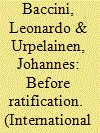

|
|
|
|
|
| Publication |
2014.
|
| Summary/Abstract |
When do international treaties cause domestic policy adjustments? While previous research emphasizes the consequences of treaty ratification, we argue that the need to secure entry into force can induce states to change their policies already before ratification. If a state expects benefits from a treaty, it can increase the probability of foreign ratification by implementing policies that benefit pivotal domestic players within its partner country. Accordingly, studies that focus on policy change after ratification underestimate the importance of treaties and partly misconstrue the causal connection between treaties and policies. We test the theory against data on the relationship between North-South preferential trading agreements (PTAs) and automobile emission standards, finding that developing countries adopt automobile emission standards between the signature and ratification of North-South PTAs.
|
|
|
|
|
|
|
|
|
|
|
|
|
|
|
|
| 19 |
ID:
131985
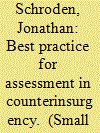

|
|
|
|
|
| Publication |
2014.
|
| Summary/Abstract |
In September 2011, the Commander of the International Security Assistance Force (ISAF) in Afghanistan directed the Afghan Assessment Group to redesign the way in which ISAF was assessing the status of the war, and to be 'revolutionary' in so doing. The resulting assessment paradigm was novel, non-doctrinal, and effectively addressed the unique complexities of the counterinsurgency in Afghanistan and the needs of the ISAF Commander. It had a two-tier structure consisting of both strategic and campaign assessments. The former focused on answering a set of strategic questions in narrative, analytic form to address the strategic environment, while the latter used a set of standards and accompanying narrative responses to gauge accomplishment of campaign tasks. Both tiers captured the current state of the war while maintaining an eye on future challenges and opportunities. The two assessments and their associated processes were designed to stimulate discussions leading directly to decisions by senior leaders on actions they could take, direct, or request. While any assessment paradigm will have advantages and disadvantages, an examination of the pros and cons of this assessment paradigm makes clear that it should be considered a 'best practice' in the field of counterinsurgency assessment.
|
|
|
|
|
|
|
|
|
|
|
|
|
|
|
|
| 20 |
ID:
131627
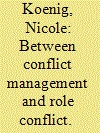

|
|
|
|
|
| Publication |
2014.
|
| Summary/Abstract |
This paper assesses the role of the European Union in the Libyan crisis (2011) and critically considers the implications for its evolution as an international security actor. Employing role theory, the paper reviews the historical development of the Union's security actorness and sheds specific light on the balance between self-conception and external expectations in the case of the Libyan crisis. Its central argument is that, despite external expectations and European narratives of a 'comprehensive power role', the Libyan crisis showed that the Union still acts in line with its traditional role as a civilian power. The inability to go beyond civilian power stemmed from internal dissonance on a potential hard power role and a corresponding lack of material capabilities. The growing gap between expectations about comprehensive actorness on the one hand and performance on the other is likely to damage the Union's future credibility as an international security actor.
|
|
|
|
|
|
|
|
|
|
|
|
|
|
|
|
|
|
|
|
|